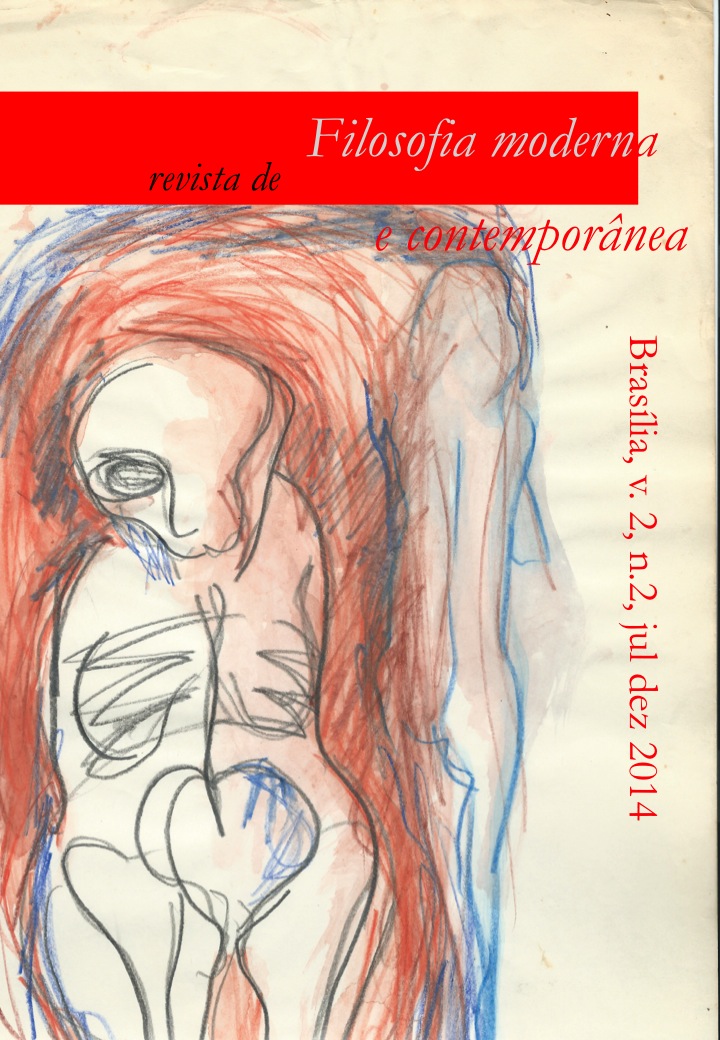The political detour of Arendt’s thesis on Augustine
DOI:
https://doi.org/10.26512/rfmc.v2i2.12481Keywords:
Arendt, Augustine, Action, Memory, ConfidenceAbstract
Arendt's thesis on Augustine (Der Liebesbegriff bei Augustin / Love in Augustine) ”“ presented in 1929 and revised by the author between the 1950’s and 1960’s ”“ is usually taken as a work of youth and therefore neglected by her readers. Against this trend, this paper suggests that we can find in these writings the emergence of themes that will be transposed in later Arendt's efforts to illuminate the political experience. My aim here consists in presenting a general comment on this thesis, indicating its possible similarities with the texts from her maturity, especially with regard to three issues: the revelation of a singular being through action; the role of memory and narrative in the constitution of our existence; and confidence as the only guarantee for our agreements and promises.
Downloads
References
ADLER, Laure. Nos Passos de Hannah Arendt. Trad.: Tatiana Levy e Marcelo Jacques. RJ: Record, 2007.
AGOSTINHO. Confissões / De Magistro (Os Pensadores). Trad.: J. Oliveira Santos e A. Ambrósio de Pina. São Paulo: Abril Cultural, 1973.
ARENDT, H. Between Past and Future. New York: The Viking Press, 1961.
”“”“”“”“”“”“. The Origins of Totalitarianism. New York: Harcourt, 1985.
_______. Love in Saint Augustine. (ed. Joanna Scott e Judith Stark). Chicago: The University of Chicago Press, 1996.
_______. O Conceito de Amor em Santo Agostinho. Trad.: Alberto P. Dinis. Lisboa: Instituto Piaget, 1997.
_______. The Human Condition. 2ed. Introduction by Margaret Canovan. Chicago: University of Chicago Press, 1998.
_______. Denktagebuch: 1950 bis 1973 ”“ vol. 1. Ursula Ludz e Ingeborg Nordmann (ed.). Munich: Piper, 2002.
_______. A Promessa da Política. Org.: Jerome Kohn. Trad.: Pedro Jorgensen Jr. Rio de Janeiro: DIFEL, 2008a.
_______. Compreender : formação, exílio e totalitarismo (ensaios) 1930-1954.Trad.: Denise Bottman. São Paulo: Companhia das Letras, 2008b.
”“”“”“”“”“”“. Homens em Tempos Sombrios. Trad.: Denise Bottmann. São Paulo: Companhia das Letras, 2008c.
ESPOSITO, Roberto. Communitas. Trad.: Carlo Rodolfo M. Marotto. Buenos Aires: Amorrortu, 2003.
KAMPOWSKY, Stephan. Arendt, Augustine, and the New Beginning.G r a n d R a p i d s : E e r d m a n s Publishing, 2008.
KRISTEVA, Julia. Hannah Arendt ”“ Life Is a Narrative. Trad.: Frank Collins. Toronto / Buffalo / London: University of Toronto Press, 2001.
VILLA, Danna. Arendt and Heidegger : The fate of the political. Princeton University Press, 1996.
COLLIN, Françoise. Nacer y tempo. A g u s t í n e n e l p e n s a m e n t o arendtiano. Hannah Arendt ”“ El orgullo de pensar (Birulés, Fina. Org.). Barcelona: Gedisa Editorial, 2000.
DUARTE, André. Hannah Arendt e o pensamento político sob o signo do Amor Mundi. Mulheres de Palavra. Maria Clara l- Bingemer; Eliana Yunes (ed.). Rio de Janeiro: Ed. Loyola, pp. 33-48, 2003. Disponível em: <http://works.bepress.com/andre_duarte/25>. Acesso em: 14 de Setembro, 2012.
ESPOSITO, Roberto. ¿Polis o comunitas?. Hannah Arendt ”“ El orgullo de pensar.(Fina Birulés, org.). Barcelona: Gedisa Editorial, 2000.
TSAO, Roy. Arendt’s Augustine. Politics in Dark Times: encounters with Hannah Arendt. Seyla Benhabib. (ed.). New York: Cambridge University Press, 2010.
BAGEDELLI, Pablo. Entre el ser y la vida: el concepto de natalidad en Hannah Arendt y la posibilidad de una ontología política. Revista SAAP, vol. 5, n. 1, pp. 37-58, 2011.
CLARK, Barry; QUILL, Lawrence. Augustine, Arendt, and Anthropy. Sophia: International Journal for Philosophy of Religion, Metaphysical Theology and Ethics, 48.3, pp. 253-265, 2009.
CORREIA, Adriano. Sobre o trágico na ação: Arendt (e Nietzsche). O que nos faz pensar. nº29, pp. 59-74, 2011.
LEMM, Vanessa. Memory and promise in Arendt and Nietzsche. Revista de Ciência Política, vol. 26, nº 2, pp. 161-173, 2006.
SCOTT, Judith. What St. Augustine Taught Hannah Arendt about ‘how to live in the world’: Caritas, Natality and the Banality of Evil. Hannah Arendt: Practice, Thought and Judgement. Mika Ojakangas (ed.). Studies across Disciplines in the Humanities and S o c i a l S c i e n c e s 8 . H e l s i n k i Collegium for Advanced Studies, pp. 8”“27, 2010. Disponível em: <http://hdl.handle.net/10138/25821>. Acesso em: 06 de Julho, 2012.
Downloads
Published
How to Cite
Issue
Section
License
Copyright for articles published in this journal is retained by the authors, with first publication rights granted to the journal. By virtue of their appearance in this open access journal, articles are free to use, with proper attribution, in educational and other non-commercial settings.


